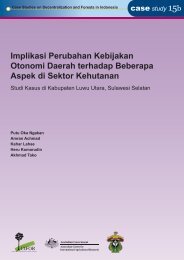Adaptive collaborative management of community forests in Asia ...
Adaptive collaborative management of community forests in Asia ...
Adaptive collaborative management of community forests in Asia ...
Create successful ePaper yourself
Turn your PDF publications into a flip-book with our unique Google optimized e-Paper software.
226 • Cynthia McDougall, Ravi Prabhu and Robert Fisher<br />
Our basic hypothesis <strong>in</strong> this research—as outl<strong>in</strong>ed <strong>in</strong> Chapter 1—was that<br />
the provision <strong>of</strong> opportunities for <strong>collaborative</strong> learn<strong>in</strong>g, negotiation and<br />
plann<strong>in</strong>g could contribute to better <strong>management</strong> <strong>of</strong> complexity and better<br />
negotiation amongst people with differ<strong>in</strong>g and compet<strong>in</strong>g objectives for<br />
forest <strong>management</strong>. Based on the research presented <strong>in</strong> these pages, an<br />
adaptive <strong>collaborative</strong> <strong>management</strong> approach does <strong>of</strong>fer a viable approach<br />
for enhanc<strong>in</strong>g the quality <strong>of</strong> governance <strong>in</strong> the complex conditions <strong>of</strong><br />
<strong>community</strong>-based forestry. Although the trends look promis<strong>in</strong>g, the short<br />
duration <strong>of</strong> the research and the myriad confound<strong>in</strong>g factors recommend<br />
that we be cautiously rather than strongly optimistic about ACM’s ability<br />
to enhance livelihoods for local people and achieve more equitable<br />
governance and susta<strong>in</strong>able outcomes.<br />
This br<strong>in</strong>gs us back to one <strong>of</strong> the reasons for want<strong>in</strong>g to share the learn<strong>in</strong>g<br />
from the research: <strong>community</strong> forestry can be seen as a microcosm <strong>of</strong> global<br />
environmental <strong>management</strong>. Just as forest-dependent people face the<br />
challenges <strong>of</strong> <strong>in</strong>creas<strong>in</strong>gly limited resources, a grow<strong>in</strong>g multitude <strong>of</strong> resource<br />
users, and dynamic natural systems, so too do nations and <strong>in</strong> fact the entire<br />
global <strong>community</strong>. Diverse human systems are <strong>in</strong>tertw<strong>in</strong>ed with—and<br />
dependent on—each other and these natural systems. In the years s<strong>in</strong>ce the<br />
research began, it has become <strong>in</strong>creas<strong>in</strong>gly clear that although rigid, l<strong>in</strong>ear<br />
approaches may be more readily managed by bureaucracies and top-down<br />
policy frameworks, they cannot help rural communities achieve resilience<br />
and well-be<strong>in</strong>g. It is time to move on from policies and practices developed<br />
under paradigms <strong>of</strong> environmental control and ‘consequence-free’ action.<br />
Just as the communities <strong>in</strong> this research have struggled to build their own<br />
resilience, the global <strong>community</strong> needs to build its own collective resilience<br />
through more humble, learn<strong>in</strong>g-based and flexible approaches that draw<br />
on diverse and collective wisdom.<br />
Endnotes<br />
1 The reason for the difference between the Mal<strong>in</strong>au <strong>in</strong>itiative (Chap 5) and<br />
the rest <strong>of</strong> the case studies: began earlier than the other three cases and was not part<br />
<strong>of</strong> the ADB funded ACM project. As po<strong>in</strong>ted out <strong>in</strong> Chapter 5, the project ‘sought<br />
to empower local communities to <strong>in</strong>crease their access and control over forest benefits and<br />
decisions’ through ‘stimulat<strong>in</strong>g cooperation among stakeholders’. Unlike the other<br />
three projects it did not aim to test ACM approaches to assess their effectiveness.<br />
2 In this context ‘meso-level’ Signifies levels <strong>of</strong> governance between the ‘local’<br />
or <strong>community</strong> level, where primary users and managers <strong>of</strong> <strong>forests</strong> are active, and the<br />
national level where broad policy and legislation are developed and regulated.
















